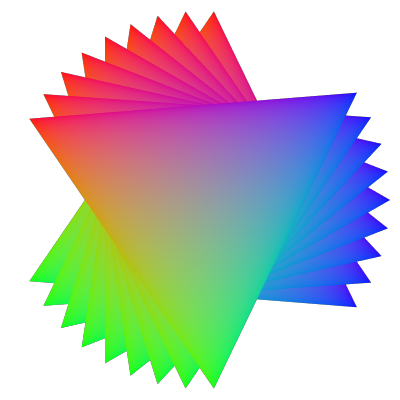
ModernGL
ModernGL is a Python wrapper over OpenGL Core. ModernGL simplifies the creation of graphics applications like scientific simulations, games or user interfaces.
Usually, acquiring in-depth knowledge of OpenGL requires a steep learning curve. In contrast, ModernGL is easy to learn and use.
ModernGL is capable of rendering with high performance and quality, with less code written.
pip install moderngl
glcontext - Headless Context Creation
pip install moderngl[headless]
moderngl-window - Window Creation and Resource Loading
pip install moderngl-window
Features
- GPU accelerated high quality graphics
- Rendering modern OpenGL scenes with less headache
- Simpler and faster than PyOpenGL
- Can render without a window
- 100% Pythonic
Sample usage
>>> import moderngl
>>> ctx = moderngl.get_context()
>>> buf = ctx.buffer(b"Hello World!")
>>> buf.read()
b'Hello World!'
For complete examples please visit the Examples.
Easy to use with Pillow
>>> img = Image.open("texture.jpg").convert("RGB")
>>> ctx.texture(img.size, 3, img.tobytes())
<Texture: 1>
Easy to use with Numpy
>>> ctx.buffer(np.array([0.0, 0.0, 1.0, 1.0], dtype="f4"))
<Buffer: 1>
Compared to PyOpenGL
With PyOpenGL, using the original OpenGL API, you have to write three lines to
achieve a simple task like binding a VBO:
vbo1 = GL.glGenBuffers(1)
GL.glBindBuffer(GL.GL_ARRAY_BUFFER, vbo1)
GL.glBufferData(GL.GL_ARRAY_BUFFER, b"Hello World!", GL.GL_STATIC_DRAW)
vbo2 = GL.glGenBuffers(1)
GL.glBindBuffer(GL.GL_ARRAY_BUFFER, vbo2)
GL.glBufferData(GL.GL_ARRAY_BUFFER, None, GL.GL_DYNAMIC_DRAW)
With ModernGL you need just one simple line per VBO to achieve the same results:
vbo1 = ctx.buffer(b"Hello World!")
vbo2 = ctx.buffer(reserve=1024, dynamic=True)
Development
git clone git@github.com:moderngl/moderngl.git
cd moderngl
python -m pip install -e .
Using GLSL in ModernGL
GLSL (OpenGL Shading Language) is integral for shader programming using the ModernGL library. It allows developers to execute code on the GPU, enhancing graphics rendering performance. This concise introduction covers the core concepts necessary for starting with GLSL in ModernGL.
Data Types
GLSL offers standard data types similar to C, including int, float, double, and bool, as well as graphics-specific types like vectors (vec2, vec3, vec4) and matrices (mat2, mat3, mat4) for efficient graphics computations.
Inputs and Outputs
Attributes: Per-vertex data passed to the vertex shader. Commonly used for positions, normals, and texture coordinates.
Varyings: Interpolated data passed from the vertex to the fragment shader, such as colors or texture coordinates.
Output: Fragment shader's output, typically the color of the pixel (fragColor).
Uniforms
Uniforms are global variables declared in shaders, constant for all vertices or fragments for a single draw call. They're ideal for passing data from your application, like transformation matrices or material properties, to the shader.
Shader Types
Vertex Shader: Processes each vertex's attributes. It's the first stage in the shader pipeline, used for transformations and passing data to the fragment shader.
Fragment Shader: Calculates the color of each pixel. It uses data interpolated from the vertex shader to apply textures, lighting, and color.
Geometry Shader: Processes primitives (points, lines, triangles) formed by vertices from the vertex shader. It can add or remove vertices from the primitive.
Tessellation Shaders: Control the tessellation of patches, allowing for smoother geometries at varying distances.
Compute Shader: Handles general-purpose computing tasks not directly related to rendering images, like physics simulations or post-processing effects.
Example
glsl
// Vertex Shader
#version 330 core
in vec3 position;
uniform mat4 modelViewProjection;
void main() {
gl_Position = modelViewProjection * vec4(position, 1.0);
}
// Fragment Shader
#version 330 core
out vec4 fragColor;
void main() {
fragColor = vec4(1.0); // Set pixel color to white
}
This basic example demonstrates a vertex shader transforming vertex positions with a matrix and a fragment shader setting the color of each pixel to white.
Notes
ModernGL may be faster than other libraries providing direct OpenGL access.
ModernGL is implemented in C++ and a single render call involving multiple OpenGL functions count as a single Python function call.
ModernGL require OpenGL 3.3. Compute Shaders require OpenGL 4.3.
Some functionality relies on specific extensions.
ModernGL can be used anywhere where OpenGL is supported. ModernGL is also working in a headless environment.
ModernGL is responsible for calling the OpenGL API and providing a Pythonic user-friendly API instead.
It is possible to integrate moderngl into any window libraries that support OpenGL.
Consider moderngl-window which implements many of them, plus it also helps with resource loading.
ModernGL does not implement the full OpenGL feature set or extensions. You can interact with the ModernGL objects from OpenGL.
Citation
If you need to cite this repository in academic research:
@Online{Dombi2020,
author = {Szabolcs Dombi},
title = {ModernGL, high performance python bindings for OpenGL 3.3+},
date = {2020-05-01},
publisher = {GitHub},
journal = {GitHub repository},
howpublished = {\url{https://github.com/moderngl/moderngl}},
commit = {<insert hash if needed>}
}
The commit hash can be found in the Releases.



